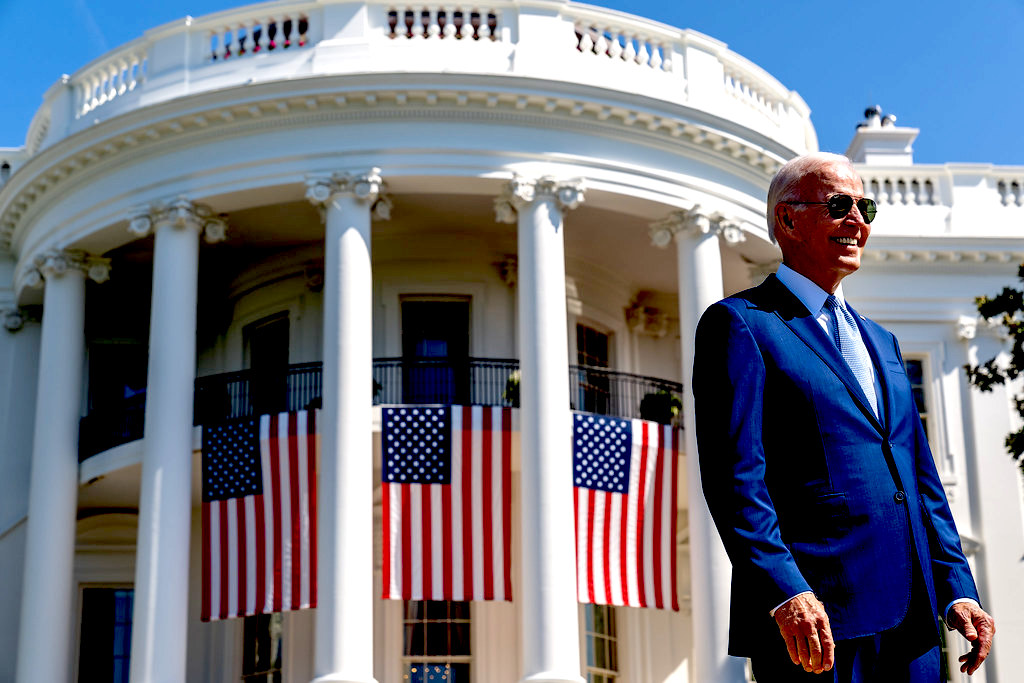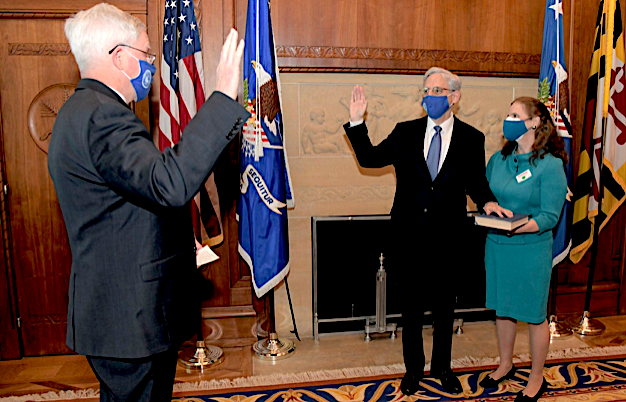The administration continues a trend over many years under both Republican and Democratic presidents, Jake Johnson reports.

President Joe Biden in August 2022. (White House, Erin Scott)
Despite the Biden administration’s pledge to crack down on corporate crime, an analysis of Justice Department data shows that business prosecutions fell to a record low in fiscal year 2022 even as there appeared to be no shortage of wrongdoing— from healthcare fraud to large-scale price gouging.
The Transactional Records Access Clearinghouse (TRAC), a nonprofit data-gathering outfit, noted Thursday that out of the more than 4,000 federal white-collar prosecutions last year, “under 1% or only 31 of these defendants were businesses or corporate entities.”
“This is the lowest number of criminal prosecutions of business entities for white-collar offenses since federal prosecutor tracking began for these in FY 2004,” TRAC observed. “The decision to criminally charge a business in contrast to an individual for engaging in white-collar criminal activity is exceedingly rare (just 1%).”
TRAC also found that “the prosecution of white-collar offenders in FY 2022 reached a new all-time low since tracking began during the Reagan administration.”
While vowing to break with its predecessor and take a tougher stand against corporate crime, the Biden Justice Department has made explicit that its “top priority for corporate criminal enforcement” is “going after individuals” rather than institutions, pointing to the high-profile convictions of Theranos founder Elizabeth Holmes and former JPMorgan traders.

Merrick Garland swearing in as attorney general in March 2021. (Justice Department, Wikimedia Commons)
Corporate prosecutions have been plummeting for years under both Republican and Democratic presidents, a trend that has been attributed in part to the rise of deferred and non-prosecution agreements.
The consumer advocacy group Public Citizen pointed out in a report last year that “over the past two decades, such agreements have become the DOJ’s routine method for resolving criminal cases against big corporations.”
Support CN’s
Winter Fund Drive!
“Because of the simultaneous trends of declining corporate prosecutions and the DOJ’s increased reliance on corporate leniency agreements, the agreements made up over a quarter (26%) of the cases in 2021,” the group added. “While this is a decline from 2020’s record-high percentage of corporate leniency agreements (32%), it remains extraordinarily high, especially in comparison with two decades ago, when prosecutors entered leniency agreements with corporate criminals only about 1% of the time.”
In a separate report published in 2021, Public Citizen identified a number of major U.S. corporations bound by DOJ leniency deals that allowed them to escape criminal prosecution in exchange for reforming their practices. Corporations have often violated such agreements — and faced no consequences for doing so.
Among the corporations currently under DOJ leniency deals that are set to expire this year, according to Public Citizen’s report, are Chipotle, Wells Fargo, JPMorgan Chase, Goldman Sachs and Ticketmaster, the last of which is currently facing a Justice Department antitrust probe.
In a September speech, Deputy Attorney General Lisa Monaco acknowledged the sharp decline in corporate criminal prosecutions in recent years and said the DOJ needs to “do more and move faster.”
But critics said the policy changes that Monaco outlined during her address — from incentives for companies to self-report misconduct to a shift away from successive non-prosecution agreements with the same company — are woefully inadequate in the face of widespread corporate abuses.
“Corporate crime — in the form of illegal pollution, fraud, reckless endangerment of consumers and workers, cartels, systematic rip-offs, and more — remains rampant, but corporate criminal prosecutions are at historically low levels,” Public Citizen president Robert Weissman said at the time. “It’s time to end leniency deals for corporate wrongdoers. Corporations are the ultimate rational actors: If they know the costs of breaking the law are worth it for expected monetary gain, then they will break the law — irrespective of the societal damage.”
Jake Johnson is a staff writer for Common Dreams.
This article is from Common Dreams.
The views expressed in this article and may or may not reflect those of Consortium News.
Support CN’s
Winter Fund Drive!
Donate securely by credit card or check by clicking the red button:


Merrick Garland, our AG, wasn’t he the guy that Obama wanted to put on the SC? Hmm, I suspect he wouldn’t be any tougher on Big Business on the Court than he is as the AG, which office i suspect was given to him as a consolation prize …
Well the Corps continue to make out like the bandits they are – when they can make a hell of a lot more money being crooks than they have to pay in fines – hey, a good investment, the Justice Dep’t gets a chunk of money and the Corps go free – almost sounds like a protection racket, doesn’t it …
As long as the D/Rs compete for “contributions” from Big Corps to keep them in power, I suspect there is a competition to see who can “punish” them the least .. Am I mistaken, or can the Corps deduct these fines from their taxes as the “cost of doing business”?
Just another reason to toss the D/Rs out …
Just as planned by our corporate leadership! Now about those documents at the former VP’s home . . . . . . it was great PLEASURE of mine to see this imposter struggle explaining himself about this incident.
Now what was it the Queen of Hearts had to say about their heads . . ?
In South Africa, it is called “State Capture”. When the Big Business Fraudsters Capture the State Regulators, Courts, Judges, Government Ministers, Ratings Agencies, South African Judges form Investigating Committees, such as the Zondo Commission probing Zuma and the Gupta Brothers.
What most of us already knew is that crime pays and pays very well.
Lies, lies and never ending lies…Not a trace of shame, not a trace of self-respect…
Giant Satanic corporations have rights; the rest of us in the US don’t. :-(